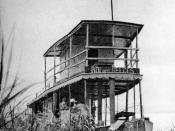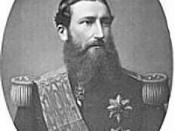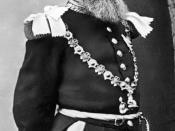The novel "Heart of Darkness", written by Joseph Conrad, is a truthful account of the atrocities occurring in Africa under the reign of King Leopold II and is a high quality aid for the study of Belgian imperialism in the Congo.
King Leopold II first became interested in the Congo as a place of colonial exploration whilst following the expeditions of the British Henry Morton Stanley in the mid nineteenth century. Leopold was adamant in finding a small colony for Belgium and an African state seemed most desirable.
The main reasons for going to the Congo were economic, political and religious. The economic motives were fueled by the desire to make money by exploiting cheap labour to remove vital raw materials such as ivory and rubber, to expand and control foreign trade and to compete for investments and resources. The political reasons were to expand Belgium's territory into other continents, to exercise their military force, to compete with other European countries, to gain power and boost national pride and security.
Finally, not only the Belgians but most Europeans believed that the Africans were uncivilised and needed to be introduced to European ways. Christian missionaries went to Africa to convert the natives but also built schools and hospitals to try and improve the quality of life. Missions, such as the Presbyterian mission set up by William Henry Sheppard, encouraged the Africans to regularly attend church. White preachers would conduct the services, spreading the Christian gospel.
At first, the Belgians thought what they were doing was justifiable, or they at least acted like they did. One such example of this is a speech made by Stanley in 1877:
"There are 40,000 naked people beyond that gateway, and the cotton-spinners of Manchester are waiting to clothe them . . . Birmingham's foundries are...


